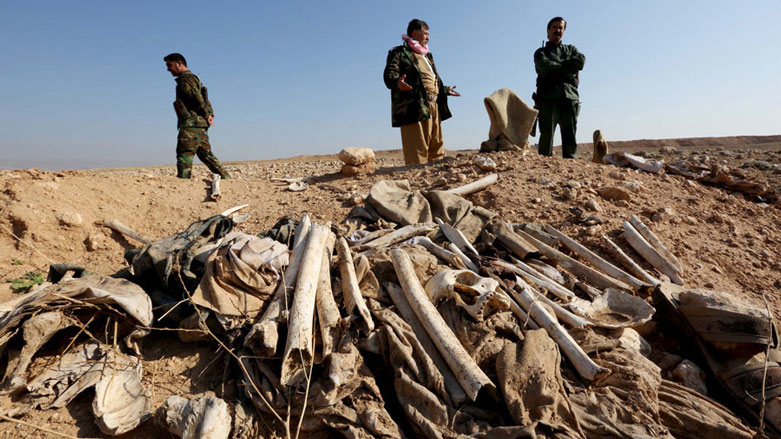68 mass graves found in Shingal since 2014, over 3,000 Ezidis still missing: Official

ERBIL (Kurdistan 24) – Since the Islamic State (IS) took over the predominantly Ezidi city of Sinjar (Shingal) in 2014, 68 mass graves have been discovered, said an official on Tuesday, and the whereabouts of more than 3,000 members of the religious minority are still unknown.
In an interview with Kurdistan 24, Director General of Ezidi Affairs in the Kurdistan Regional Government’s (KRG) Ministry of Endowments and Religious Affairs Khairi Bozani revealed the latest statistics about crimes committed by IS against Ezidis in the Kurdistan Region and Iraq.
From Aug. 3, 2014, until June 3, 2018, 68 mass graves had been discovered in Shingal, not including additional individual graves found, Bozani said. The jihadist group also detonated 68 Ezidi tombs and religious shrines in the country.
He mentioned that, over the past four years, IS has kidnapped 6,417 Ezidis in total, 3,547 of them female.
So far, 3,300 Ezidis had been freed; 1,150 of them girls and women, 337 men, 946 female children, and 867 male children.
3,117 Ezidis remain unaccounted for, according to Bozani.
This comes almost a year after Iraqi forces and Peshmerga liberated Nineveh Province, including Shingal, from the IS militants. Also, about seven months have passed since Iraq declared the final military defeat of the group in Iraq.
The official stated that the current Ezidi population in Iraq and the Kurdistan Region is about 550,000. Since 2014, 360,000 of them had been internally displaced, while more than 100,000 have immigrated abroad.
“Over the past four years, 1,293 Ezidis are known to have been killed and about 3,000 children have lost a parent [either killed or missing]. 1,759 of these lost a father, 407 lost a mother, 359 lost both parents, and 220 of their parents are still in the hands of Da’esh,” Bozani added, using Arabic pejorative for IS.
Ezidis were subjected to atrocities and mass murder at the hands of IS for years after the jihadist group overran Shingal in Aug. 2014, forcing hundreds of thousands of Ezidis to flee their homes. Others, unable to leave, remained stranded in the war zone.
IS militants conducted mass executions of Ezidis and enslaved thousands of Ezidi women and girls, selling them in markets under their control.
Kurdish Peshmerga forces, with the support of US-led coalition airstrikes, liberated Shingal in November of 2015. Following the attack and takeover by Iraqi forces and Hashd al-Shaabi militias last October throughout the disputed territories, including Kirkuk and Shingal, Peshmerga withdrew from them.
The fight against IS destroyed up to 85 percent of Shingal. Instability and insufficient infrastructure and public services have caused the town to remain, as it has been described, a ghost town.
Editing by John J. Catherine
